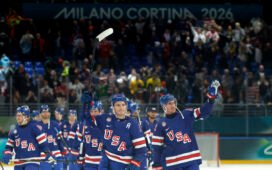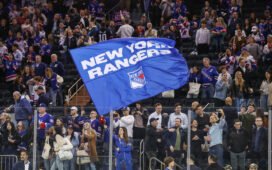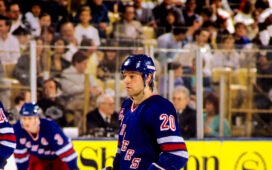In a story fit for Hollywood, the Rangers nearly signed superstar Joe Sakic away from the Colorado Avalanche. Still, the Avalanche’s parent company matched the offer, thanks to the unexpected blockbuster success of the film “Air Force One.” We can’t help but what wonder what if the Rangers offer sheet Joe Sakic wound up being successful?
At the time, Ascent Entertainment, which owned the Avalanche and the Denver Nuggets, was financially struggling. Despite winning the 1996 Stanley Cup, the Avalanche lost $8 million in the 1996-97 season, mainly due to their outdated arena.
In the 1997 offseason, after losing captain Mark Messier, the Rangers offered Sakic a three-year, $21 million deal. Knowing Colorado’s financial troubles, Madison Square Garden president Dave Checketts front-loaded the offer with a $15 million signing bonus. But “Air Force One,” released that July, became a surprise hit, grossing $315.1 million worldwide. This success gave Ascent the confidence to match the Rangers’ offer on August 14, 1997.
Sakic remained with the Avalanche for his entire 21-year career, winning a second Stanley Cup in 2001. He later became the team’s general manager and president, leading them to another championship in 2022. A 2012 Hall of Fame inductee, Sakic finished his career with 1,641 points, ranking ninth in NHL history.
But what if the Rangers had successfully signed Joe Sakic? This is a scenario many Rangers fans have pondered, and it was recently discussed on an episode of Live From The Blue Seats.
If Sakic had joined the Rangers in 1997-98, the team likely would have made the playoffs. With Mike Keane and Brian Skrudland already on board, Sakic would have been a perfect fit alongside Wayne Gretzky. Instead of signing Pat LaFontaine, the Rangers could have secured a stronger offensive force in Sakic, who would have had a bigger impact on the team at that stage of his career.
Assuming Sakic stayed healthy, his points total would probably have exceeded the 63 he managed that season with Colorado. Surrounded by talents like Alexei Kovalev, Marc Savard, and Kevin Stevens, Sakic’s presence could have elevated the entire roster. Combined with the remaining core from the 1994 championship team—Brian Leetch, Adam Graves, and Jeff Beukeboom—the Rangers could have fielded a more balanced and competitive lineup, potentially making a deep playoff run, instead of missing the playoffs entirely.
Adding Sakic might have provided the Rangers with an extra offensive weapon and a boost on special teams, along with his reliable defensive play. This move could have shifted the Rangers’ focus away from a second reunion with Mark Messier, leading the team to build around Sakic and gradually move on from the 1994 era.
Perhaps with Sakic in the lineup, the Rangers could have avoided the constant shuffle of young talent and depth players, allowing the team to gel better. It’s possible that Colin Campbell might have retained his job as head coach, or that the Rangers could have had the assets to acquire Pavel Bure instead of Florida.
Management might have also prioritized spending on defense and investing in Brian Leetch rather than bringing in older players. While Theo Fleury might still have been signed, the presence of Sakic could have meant the Rangers wouldn’t have traded for Eric Lindros.
In this alternate timeline, Wayne Gretzky might have extended his career, leading to more playoff appearances and memorable runs in the late ’90s and early 2000s. After the offer sheet drama, Sakic posted 81, 96, and 118 points over the next few seasons in Colorado—numbers that likely would have propelled the Rangers into the playoffs had he been in New York.
While it’s impossible to know for sure what might have happened, one thing is certain: Joe Sakic was an elite player with a profound impact on the game. Although this is all speculative, it’s intriguing to consider how different the Rangers’ fortunes might have been if Sakic had worn blue instead of burgundy.
Sure, it’s fun to think about the positives, but it’s hard to imagine such an elite player having anything less than a significant impact—even with a different team. After all, it’s not like he’s a Hall of Famer or anything.








Recent Comments